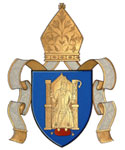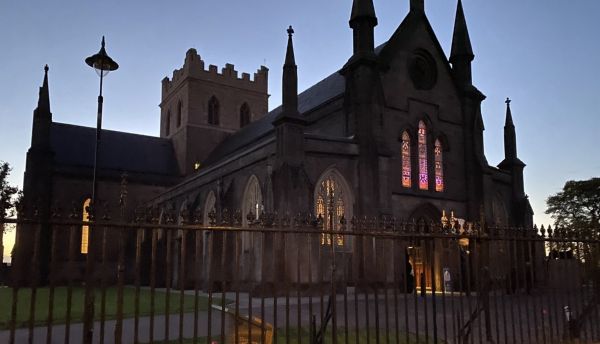 |
 |
News
Church leaders lead service of reflection and hope

Armagh Cathedral.
The Service of Reflection and Hope to mark the centenary of the Partition of Ireland and the formation of Northern Ireland took place in St. Patrick’s Church of Ireland Cathedral, Armagh on Thursday, 21st October.
Organised and hosted by the Church Leaders’ Group, it was attended by representatives from the governments of the United Kingdom including Prime Minister, Boris Johnston M.P.; the Republic of Ireland represented by the Minister for Foreign Affairs, Simon Coveney T.D. and Northern Ireland represented by the First Minister of Northern Ireland, Paul Givan MLA. Her Majesty The Queen was represented by the Earl of Caledon, Lord Lieutenant for Co. Armagh.
The restricted number of guests attending were drawn from the wider community such as those involved in peace-building, community development, health, youth work and various aspects of church life.
The service included singing from a group of young people as well as view of a number of teenagers and a group of young people carried a lantern through the Cathedral symbolising The Light of Hope.
The service which was broadcast live by the BBC and RTÉ, was opened with a welcome from the Dean of Armagh, the Very Revd Shane Forster.
The opening prayer was in Irish read by Linda Ervine MBE and Seán Coll.
The sermon was preached by Revd Dr. Sahr Yambasu, President of the Methodist Church in Ireland.
The church leaders shared their own personal reflections at the service.
Archbishop John McDowell
In his message at the service, he said: “I was born in 1956 in working class East Belfast. It was an immensely rich culture to grow up in. So I have very warm memories of growing up and in a slightly more integrated housing estate than would be the case now. My family would definitely have thought of themselves as Unionist, although my mother in particular also had a strong sense of Irish identity, oddly enough centring round a Welsh Briton, St Patrick. However, that integration I spoke about didn't run very deep; there was always a sense of them and us not far below the surface. Friendship was plentiful. Trust was in short supply.
“Now, as a church leader I am sorry that as disciples of Jesus Christ, we didn’t do more to become peacemakers, or at least to speak peace into the situation. Too often we allowed the attitudes around us to shape our faith, rather than the other way round. That’s certainly what I mean when I say we have too often been captive churches. We obsessed about some things: especially borders. “One way or another, we’re obsessing about them again, and being distracted from really thinking about what a good society would look like. There are still far too many people who live with poverty of many kinds - educational, economic, emotional. Far from creating a society with a common purpose, the pandemic and some recent political developments have exposed just how fractured a society we’ve become. But I am hopeful. Hopeful in a new generation who know that the big problems we’ve landed them with, especially climate change and economic inequality, can only be tackled together.
“I think there are already signs that the next generation will see the things that we obsessed about as secondary, and place their priorities elsewhere. And as his disciples, I think our role is to imitate Our Lord, in acting justly, loving mercy and walking humbly with our God. Hebrews 10:23 “Let us hold unswervingly to the hope we profess, for he who promised is faithful.”
The other church leaders also gave their reflection;
The Most Reverend Eamon Martin Archbishop of Armagh and Primate of All Ireland.
He said; ‘So then let us pursue the things that make for peace and the building up of one another’ Romans 14:19. When I look back on what happened on this island in 1921, like many others in my community and tradition, I do so with a deep sense of loss; and also sadness. Because for the past 100 years partition has polarised people on this island. It has institutionalised difference, and it remains a symbol of cultural, political and religious division between our communities. I grew up in Derry, just a few miles on the northern side of the border. As a young boy I remember we often crossed the border to visit my granny and other relatives in Inishowen. At first we did so through customs, and then, in later years, through heavily fortified checkpoints. It was as if my home city had been cut off in 1921 from its natural hinterland in beautiful Donegal.
That little boy has now grown up. Today I reflect as a Church Leader on the last 100 years. I have to face the difficult truth that perhaps we in the churches could have done more to deepen our understanding of each other and to bring healing and peace to our divided and wounded communities. Jesus grew up in the midst of political and cultural division and of deep-seated historic difference. But he taught his disciples to build bridges of love and forgiveness. When he was asked, “Who is my neighbour?” he pointed to the Good Samaritan who crossed social and historic barriers to show love and mercy to the one who was on ‘the other side’. That is why I stand here today, as a disciple of Jesus, with my brothers and sisters in faith, hopeful and committed to doing what we can to build a better future for all, a future in which mistrust and division can become things of the past.
The Right Reverend Dr David Bruce, Moderator of the Presbyterian Church in Ireland
He said; “My family came from the same part of the country as Eamon’s. My father was born on a small county Derry farm 99 years ago, into a family with deep roots in Scottish Presbyterianism. At various points in his life, my father considered leaving Northern Ireland but despite the huge challenges of this century, including the great depression of the 1930s, the upheaval of the second world war, and of course the Troubles, he chose this as his home. He chose to stay and worked to make it better. I look back over these 100 years with mixed feelings. Northern Ireland is my home too, and I love it. But I lament the physical and emotional pain which has been caused over this last century to so many people by violence and the words which lead to violence.
Sadly such things remain, and not only on this island. In hope, we long for a day when, as the Apostle John describes it, God will wipe every tear from our eyes, and there will be no more death, or mourning, or crying or pain. For now, I grieve the times when fear has held us back from building relationships with those with whom we differ. If we are to build a better future then we must recognise our own woundedness and our responsibility to care for the wounds of one another. As we build that better future, relationships of all sorts; personal, community, religious and political, must mature and strengthen across this island and between these islands. As we meet as Church Leaders, I find myself around a table with others who have different national identities and political aspirations and yet with whom I share the same identity as a disciple of Jesus. I find myself at home. With my brothers and sisters I commit myself to building the mature strong relationships which we need as peace is built, so that we become a community in which each can know they belong.
Very Reverend Dr Ivan Patterson, President of the Irish Council of Churches
He said; I think we can sometimes underestimate the contribution of friendship to the work of building peace. In a divided society simple moments of human connection and hospitality can have a profound impact. Friendships with clergy from other churches has greatly enriched both my ministry and my personal life. For me, the starting point was inter-church youth work. There I saw the value of setting an example, through our friendship and collaboration, for young people who were willing to take risks to build space in which they could listen respectfully to each other. Today, the religious landscape of this island has changed. In an increasingly multicultural society, Church and community are enriched by different cultures, ethnicities and traditions. We need to hear their voices too. While it is important that we continue to show leadership to our young people by coming together as Church Leaders, we recognise that our failure, even to talk well together about the ways in which the past continues to affect us all, hampers them in addressing that unfinished work of peace so important for the future. We have heard their voices clearly and powerfully today, we need to learn from their example. They are a generation who want to build peace, a generation who respect and care for this planet in solidarity with the poorest and most vulnerable here and around the world. As a disciple of Jesus with my brothers and sisters I commit myself to supporting that generation, even where that means that we must sacrifice some things which were important in the past for the sake of those generations who are to come.